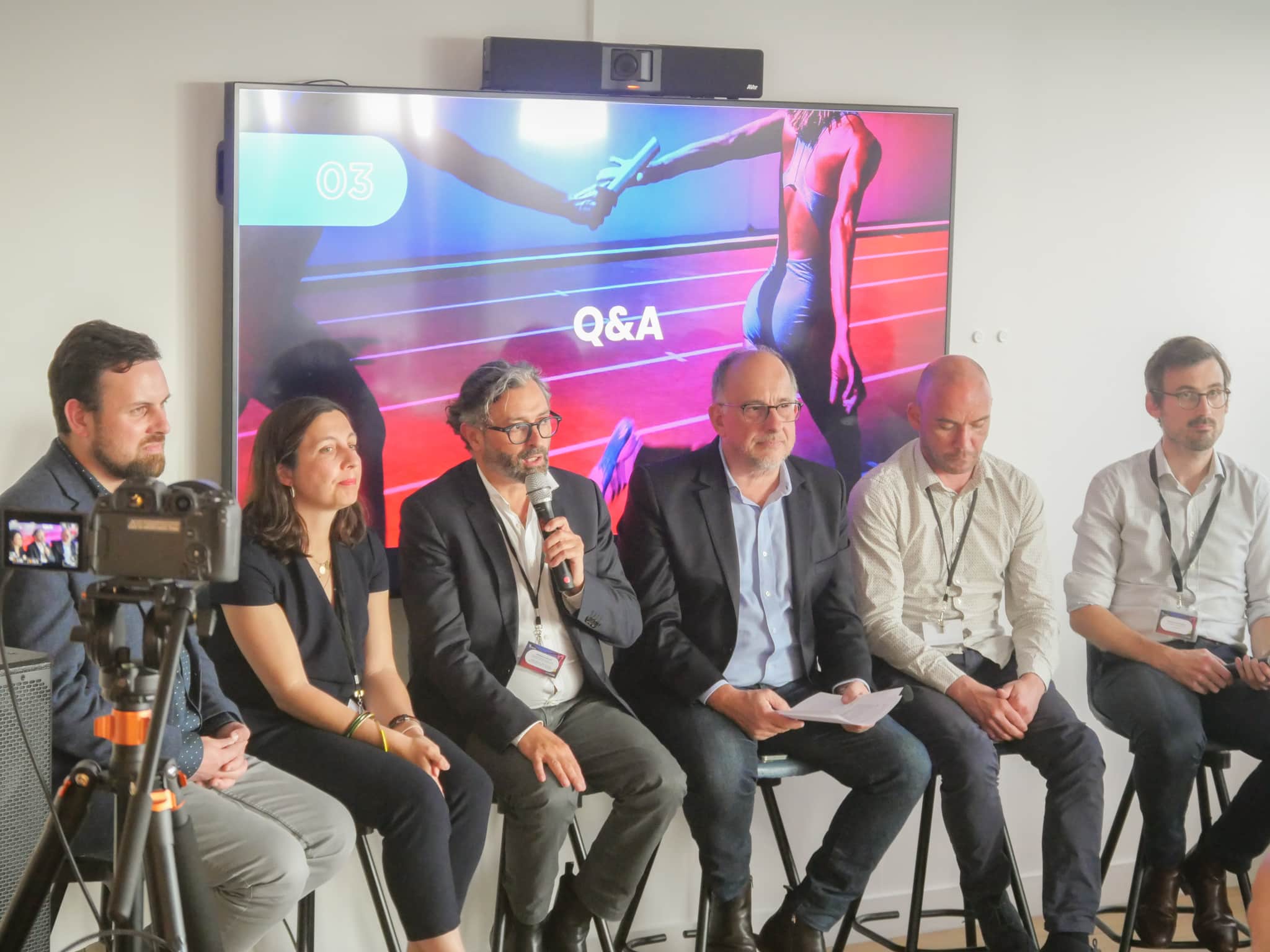The central role of data in delivering the Paris 2024 Olympic and Paralympic Games
As we get closer to the start of the world's biggest sporting event, we look at the role of data in preparing for the Paris 2024 Olympic and Paralympic Games, which start on July 26th 2024.

As we get closer to the start of the world’s biggest sporting event, we look at the role of data in preparing for the Paris 2024 Olympic and Paralympic Games, which start on July 26th 2024.
To find out more, a recent Opendatasoft webinar brought together data and sports experts involved in the games to discuss the impact of data on the planning, management and optimization of the event experience.
We looked at the multiple ways that data influences not only logistics and field operations, but also how it enriches the experience of spectators and TV viewers. and the overall legacy the games will leave.
In this article, we highlight the key points from the webinar – for more details a replay of the event is available (in French).
The key players in the sports & data ecosystem
The webinar brought together a variety of experts, each bringing a unique perspective on the use of data in major sporting events.

- Jean-Marc Lazard, CEO of Opendatasoft, introduced the webinar by highlighting the critical role of data in improving collaboration and organizational efficiency.
- Guillaume Martinetti, Head of Data & Analytics Paris 2024, shared insights on ticketing optimization and the real-time logistics required to meet the demands of such a major event.
- Antoine Carette, Chief Data Officer, Île-de-France region, discussed the consolidation and use of regional data to improve public services and event management, illustrating the impact of data in the public sector.
- Noémie Claret, EMEA Sports Marketing & Brand Partnerships Senior Lead at Salesforce, explained how data is used to create strategic partnerships and engage fans through targeted and personalized marketing campaigns, enriching the overall experience.
- Dominique Lebailly, Project Manager for the development of physical and sports activities at the Ministry of Sport and the Olympic and Paralympic Games, discussed the use of data to strengthen sports policies and access to infrastructure, highlighting its role in the promotion of physical activity.
- Philippe Ajuelos, Administrator of Data, Algorithms and Source Codes (AMDAC) at the Ministry of National Education and Youth, demonstrated the importance of data in the creation of educational and sports policies.
Each speaker highlighted how data can optimize performance, improve the user experience, and deliver a lasting legacy from international sporting events.
The importance of data in planning and monitoring international sporting events
Planning international sporting events, such as the upcoming one in Paris, relies heavily on the strategic use of data from the early design phases all the way through to execution. By harnessing data, organizers can ensure that all the different operational elements work together seamlessly at scale.
Ticketing optimization
Guillaume Martinetti explained how using data improves ticketing management. By analyzing sales trends and consumer preferences organizers can create targeted marketing campaigns and adjust prices dynamically. Predictive models show potential demand for specific events, allowing tickets prices to be modified in real-time, based on the levels of interest. For example, prices can be increased for high-demand sports or lowered to fill seats for less popular events. This strategy aims to maximize revenue while improving the spectator experience, ensuring that events are accessible, satisfying, and well-supported.

Tailoring operations based on spectator needs
Antoine Carette stressed the importance of extensive preparation so that all community data can be used effectively. By consolidating and harmonizing data from different sources, organizers can personalize the spectator experience more precisely. This analysis helps identify specific trends amongst visitors, making it easier to tailor services to better meet their expectations. For example, by optimizing the management of visitor flows and adjusting what is available on specific physical games sites, organizers can reduce waiting times and improve access to services. This personalization is only possible through careful data preparation and close collaboration between different data providers.
Data management at scale
Philippe Ajuelos highlighted the challenges of managing large volumes of data at major events, stressing the importance of advanced technology for real-time processing and data quality. To ensure data is high quality and reliable his team publishes its data on an open data portal, inviting the public to review and report any errors so they can be quickly corrected.
He also demonstrated this approach via an interactive map that allows people to see sports facilities across the country. Accessed on the data.education.gouv.fr site, this map allows users to provide feedback, enabling information, such as around opening times and accessibility to be refined and improved. This all illustrates the importance of technology and open data to improving public engagement and infrastructure management.
Enhancing the user experience through data
The intelligent use of data is radically transforming the spectator experience at major sporting events, enabling unprecedented levels of personalization to increase engagement and satisfaction.
Customizing the User Experience
Noémie Claret from Salesforce explained how data personalizes the spectator experience. For example, by analyzing user preferences, notifications and content can be tailored specifically to their interests. For example, if a spectator is particularly interested in athletics, they will be sent notifications about track and field events, relevant ticket offers, and exclusive content such as interviews with star athletes. This personalization improves spectator engagement and satisfaction by providing them with hyper relevant information and tailored offers.
Improved engagement via mobile apps
Guillaume Martinetti outlined how official apps use data to enrich the spectator experience, by providing personalized information in real-time, such as offering optimized routes to venues, along with details of events and the athletes taking part. For example, depending on where the spectator will be sitting, the app can suggest the best route to avoid the crowds, display live statistics on competitions, or offer discounts on souvenirs. This use of data improves spectator engagement by providing a smoother and more personalized experience.
Personalized communications and the use of real-time feedback
Strong communication before, during, and after the event is crucial to keeping spectators engaged. With advanced segmentation, personalized emails are sent to attendees, including event reminders, exclusive offers, and actionable information tailored to their individual preferences.
At the same time, analysis of feedback from social networks makes it possible to adjust strategies in real-time. Spectator feedback and sentiment can be monitored to quickly identify issues and make immediate adjustments. For example, if a large number of spectators report difficulties accessing a particular site, organizers can quickly take action, such as by redirecting traffic or improving directions provided via the mobile app.
Improved athletic performance
Data is not only about improving the spectator experience but is also central to optimizing sports performance. Salesforce’s Noémie Claret shared how – with the help of a lab – athletes were able to use data to refine their techniques and drive improvements. By collecting and analyzing detailed data on their activities and training sessions, athletes can be provided with personalized recommendations on how they can enhance their performance. This use of data is still in its early stages in many sports but is expected to develop quickly over the coming years.
Using data to deliver a legacy and future impact
Major sporting events provide a key opportunity to leave a legacy that changes long-term behaviors and helps improve future projects. Data is a critical part of this. Guillaume Martinetti explained the data being collected helps organizers to better understand spectator preferences and behaviors, influencing the future design of stadiums and improving access to sports in underserved areas.
For his part, Philippe Ajuelos stressed the importance of knowledge and data transfer to the International Olympic Committee (IOC) and French sports bodies to improve future events and global sports initiatives. He said data-driven collaboration provides insights to optimize marketing and engagement strategies for future events, ensuring a richer and more personalized experience for fans.

Dominique Lebailly supported the importance of legacy, explaining the significant impact of data on sports development in France. Analyzing data makes it possible to identify trends, needs and gaps in current sports programs and to then better target initiatives such as youth development programs and the creation of sports infrastructure. He said that the goal is to increase the number of those involved in sport within France, by using data to evangelize and encourage the population to engage more in physical activities. This data-driven approach ensures that resources are targeted optimally in order to foster a stronger and more inclusive sports scene.
Looking forward to the future
Overall, our event highlighted the critical importance of data to the successful organization of international sports events, from optimizing ticketing, to personalizing the spectator experience, and managing the logistics of large-scale, complex events through technology. These data-driven best practices deliver value to all major sporting events, not just at this summer’s games.
Applying data-driven strategies can significantly improve efficiency, audience engagement, and profitability for all events. Organizers can deliver more personalized and enriching experiences, while laying the foundations for a lasting legacy and enabling seamless knowledge transfer to improve future international events.
To optimize the data management of your own sports events and maximize their success, contact us today and find out how Opendatasoft can help you.



